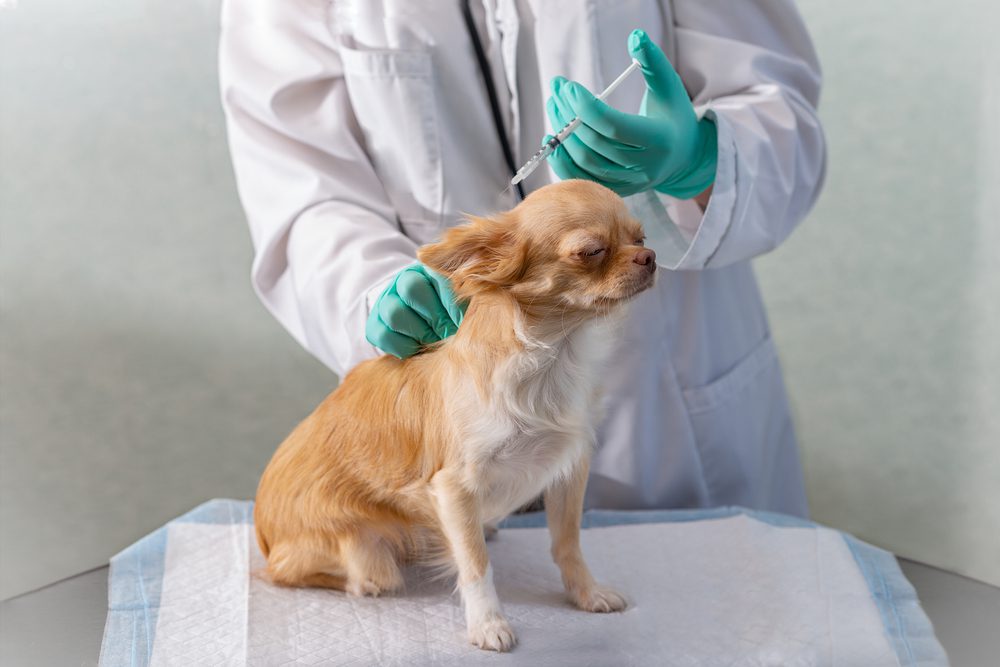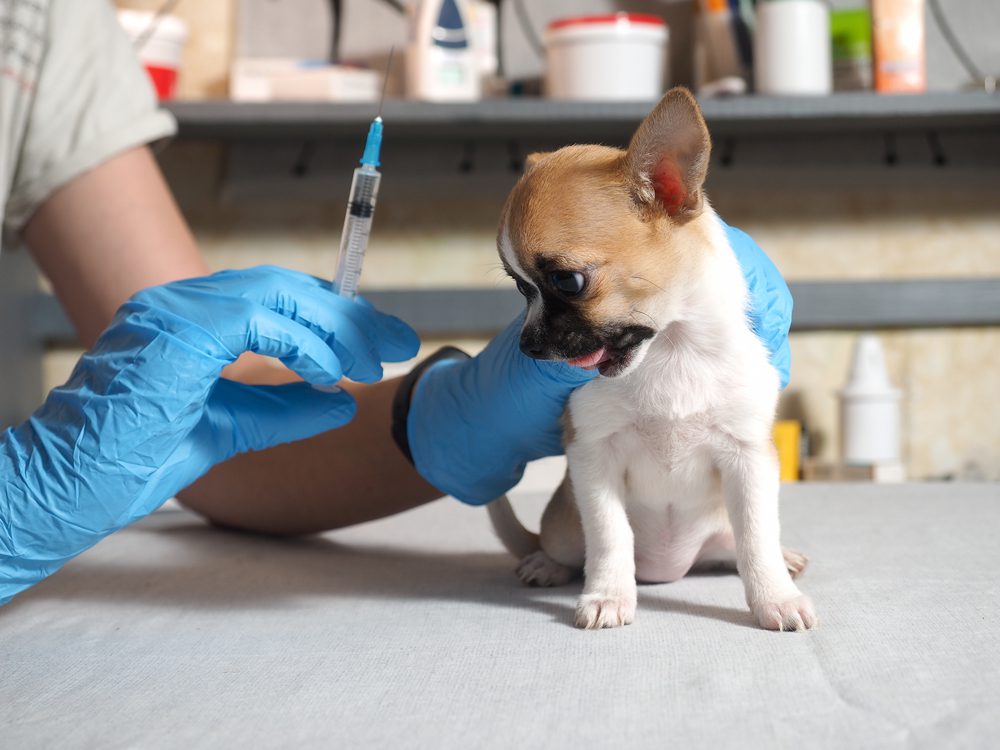Welcome back to our series on “Everything You Should Know About Your Chihuahua’s Vaccines”! This is part 3. Did you miss Parts 1 and 2? Just CLICK HERE to start with Part 1 – Introduction to vaccines.
In Part 2, we discussed what the vaccines are, how they work, and what core and non-core vaccines are. In this article, we will learn about the core vaccines, what each is for and what disease it protects your Chihuahua from. You will learn the symptoms, how the virus or disease is contracted and how to prevent your Chihuahua from getting that virus or disease.
Then, in part 4 we will discuss the non-core, also called “lifestyle” vaccines because whether your Chihuahua needs it or not depends much on where you live. From this, you will know if your Chihuahua needs any or all non-core vaccines. Here is a reminder:
Core Vaccines
- Canine Parvovirus
- Canine Distemper
- Hepatitis
- Rabies
Non-core vaccines
- Bordetella
- Canine Influenza (dog flu)
- Leptospirosis
- Lyme vaccine
The Diseases The Vaccines Protect Your Chihuahua From
Let’s discuss each vaccine and learn about the disease the vaccine will protect your Chihuahua from and how likely it may be for your Chihuahua to contract the disease. We are discussing only the core vaccines in this part three of our series.
Canine Parvovirus
What is canine parvovirus? Is your Chihuahua at risk of getting it? The parvovirus attacks the gastrointestinal system and causes:
- Bloody diarrhea
- Vomiting
- Fever
- Lethargy
- Anorexia
- Weight loss
- Weakness
- Dehydration
- Depression
These symptoms lead to extreme diarrhea that increases rapidly and can cause death within 48 to 72 hours. Puppies are the most vulnerable, however, adult dogs can also get parvovirus. Be extra cautious until your Chihuahua has had all three vaccinations for parvo.
Could Your Chihuahua Get Parvovirus?
The parvovirus is highly contagious and is spread by direct contact with an infected dog and indirectly by coming in contact with a contaminated object. Parvovirus can also be contracted from a person. If a person has touched an infected dog or a contaminated object. Food water bowl, collars, and leashes.
Prevention
Dog parks and roadside stops are dangerous for a Chihuahua puppy. Many other dogs have peed, pooped, vomited, and maybe even bled there. Not everyone is diligent about vaccinating their dog so much of the pee, poop, and vomit could very well be from a contaminated dog.
Your veterinarian’s office sees many cases of parvo on a daily, weekly, and monthly basis. The problem is that until they have seen the vet, their pawrent doesn’t know that they have it. When I worked at the veterinarians’ office once we were told that a dog has just been diagnosed with parvo, we would disinfect and rope off the entire area where that puppy and his or her pawrent had sat.

As someone who worked at a veterinarian’s office, until your Chihuahua has been fully vaccinated for the parvovirus, I would advise you not to put your Chihuahua puppy on the floor or the seat. As soon as I got home I would remove my clothes and throw them in the washing machine. I always wore the same shoes every day and left them in the garage when I got home.
Because I cleaned up pee, poop, vomit, and blood as well as carrying sick dogs I was very careful not to bring anything home to my four babies. Even though all my dogs were older and fully vaccinated for the virus, I took no chances. Sounds like a fun job, doesn’t it? Actually, I loved my job, just not that part of it.
Canine Distemper
Canine distemper is also very contagious and serious for both puppies and adult dogs. Distemper attacks the respiratory, gastrointestinal, and nervous systems.
Dogs are not the only ones that can get distemper. Wildlife, foxes, wolves, coyotes, raccoons, skunks, mink, and ferrets can also contract and carry the disease.
Distemper Symptoms
- pus-like discharge from eyes
- fever
- nasal discharge
- cough
- lethargy
- loss of appetite
- vomiting
As the virus attacks the nervous system other symptoms are
- circiling behavior
- head tilt
- muscle twitches
- convulsions
- seizures
- partial or complete paralysis
- thickening and hardening of foot pads
Distemper is often fatal, and dogs that survive usually have irreparable, permanent damage to the nervous system.
Could Your Chihuahua Get Distemper?
Distemper is an airborne disease and can be spread through sneezing or coughing and can be contracted by your Chihuahua by shared food and water bowls. An infected dog can spread the virus for months and the mother dog can pass it to their puppies through the placenta.
Your Chihuahua could be exposed to distemper through wildlife and other dogs. A Distemper outbreak (often in raccoon populations) can occur in the area and can increase the possibility of your Chihuahua becoming exposed. All adult dogs are at risk but puppies and nonvaccinated dogs are the most vulnerable.
Tips On Preventing Distemper
- Having your Chihuahua fully vaccinated for distemper is the best way to decrease the likelihood of contracting Distemper.
- Be sure that your Chihuahua’s distemper vaccine is up to date or that he still has the anitibodies to fight it off
- Avoid your Chihuahua being exposed to wildlife as much as possible
- Be very cautious when you are socializing your puppy or if your Chihuahua is not vaccinated
- Use caution at dog parks, puppy classes, obedience classes, doggy day care or anywhere that dogs may congregate
Hepatitis
There are two categories of hepatitis; infectious and chronic. Infectious hepatitis attacks the spleen, kidneys, lungs, liver, and the eyes, lining of blood vessels and may attack other organs as well.

Chronic hepatitis means that the liver has become inflamed and the death of cells has occurred. There are certain breeds that are more inclined to get hepatitis than others, and Chihuahuas are one of those breeds.
Chronic means that the infection has been damaging cells for at least a few weeks. Acute hepatitis can become systematic in just a few days. Hepatitis can be fatal in severe cases. Canine hepatitis is unrelated to human hepatitis.
Hepatitis Symptoms
- Slight fever
- Deficiency of blood clotting
- Low white blood cell count
- Congestion of mucous membranes
- Severe reduction in white blood cells
- Apathy
- Thirst
- Loss of appetite
- Blindness
- Enlarged tonsils
- Eye inflammation
- Vomiting (occasional)
- Abdominal pain (occasional)
- Severe depression
- Watery discharge from eyes and nose
- Yellow, jaundiced look to skin, gums and ears
- Swollen belly filled with fluid (chronic cases)
Could Your Chihuahua Get Hepatitis?
The most common way your Chihuahua could get hepatitis is by consuming nasal discharge, saliva, feces, from an infected dog that has recovered. An infected dog can shed the virus in its urine for at least 6 months.
How Can I Prevent My Chihuahua From Getting Hepatitis?
First by vaccinating your Chihuahua from the virus. Hepatitis vaccine is given at the same time as the distemper vaccine in the same syringe. Some say they should receive a booster throughout their entire life. We will discuss how often your Chihuahua should be vaccinated in a later series.
Don’t Miss The Rest Of Our Series. Expand to read more:
Part 4 – Non-core vaccines and Part 5, – How often do you really need to vaccinate your Chihuahua? The latest information. Don’t miss any in this series. To be notified of our next post in the series, sign up for our Weekly Tips. CLICK HERE to sign up and receive a free ebook on how to housetrain a Chihuahua.
Rabies
Rabies is one of the most devastating diseases that your Chihuahua, you, or any animal could get. It can affect any mammal, including dogs and humans. Rabies is a fatal disease that is caused by infection of the rabies virus. Your Chihuahua could potentially contract the disease from any mammal if he is bitten by an infected animal or another dog that is infected.
Rabies is a disease that is found all over the world, however, you may be surprised to learn that there are some areas that are rabies-free. That includes Australia, New Zealand, Japan, Ireland, Iceland, the United Kingdom, certain Pacific Islands, Antarctica, and parts of Scandinavia.
Symptoms of Rabies
There is an incubation period (the time from the bite and the time symptoms begin to show) and that can vary. In dogs, the incubation period is generally two weeks to four months.
After a dog has been bitten by an infected animal, rabies progresses in stages. First, the dog becomes quite changed in temperament. They may become agitated, nervous, or shy. This can last 2-3 days.

The next stage is recognized in two forms.:
Furious Rabies: This is when an infected dog becomes aggressive, extremely excitable. He may have a markedly change in appetite, eating and chewing stones, earth, rubbish, things he would never have eaten or chewed before the disease. Then paralysis sets in and he will be unable to eat or drink. Fear of water is another symptom of this form of Rabis disease.
Dumb Rabies: This is the most common form seen in dogs. The symptoms are progressive paralysis in the limbs, distortion of the face, and difficulty swallowing. Often owners think there is something caught in the dog’s throat.
Is There A Treatment For Infected Dogs?
Although there is an anti-virus serum that humans are given to prevent rabies in the event of a bite from an animal suspected to be infected with the rabies virus, there is no approved treatment for dogs.
A dog that has been bitten by an animal suspected of being infected must be isolated and closely monitored. Should the dog begin to show signs of symptoms he will be euthanized.
Rabies is a horrible disease and a gruesome way for a dog to die. Rabies is not a disease you want to take any chances with. Making sure your Chihuahua is vaccinated for rabies is crucial. The debut, however, is how often do they need to be vaccinated? (hint: we will discuss this in-depth in part 5 of our series)
In Part 4 of our series “A guide to your Chihuahua’s vaccines”, we will discuss non-core vaccines. What are they? What diseases do they prevent and how do you know if your Chihuahua needs one or more of the non-core vaccines.
Coming Up
You don’t want to miss any of our series on “The Ultimate Guide To Vaccinating Your Chihuahua. To be sure that you are notified of the next one be sure to sign up for our “Weekly Tips”. When you sign up you will also get a FREE e-book “How To Housetrain a Chihuahua”! You’ll get all the latest information on Chihuahua health, nutrition, training, and behavior every Monday. You’ll also get some exclusive deals on Chihuahua supplies you use every day. I promise no spam!
Did you miss Part One, the Introduction To Chihuahua Vaccines? CLICK HERE
Did you miss Part Two of our series “The Ultimate Guide to Your Chihuahua’s Vaccines? CLICK HERE
